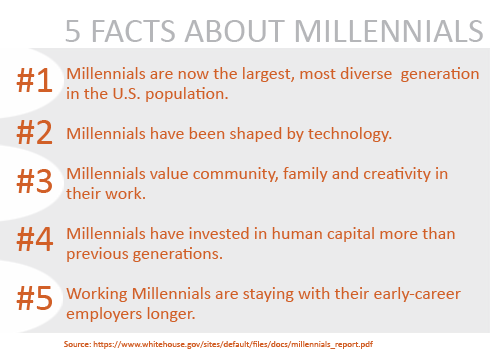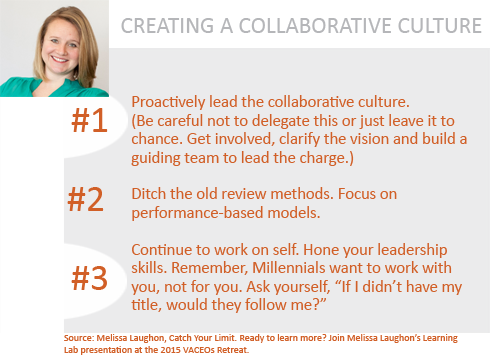Engaging the Millennial Generation
 Meet Kelly. She’s a bright, energetic young professional. Does she look scary to you? Probably not, but some CEOs and business owners might find her intimidating. You see, she’s part of the Millennial generation – the most studied generation to date. And for good reason: There are so many of them! (80 million plus, according to U.S. Census Bureau stats)
Meet Kelly. She’s a bright, energetic young professional. Does she look scary to you? Probably not, but some CEOs and business owners might find her intimidating. You see, she’s part of the Millennial generation – the most studied generation to date. And for good reason: There are so many of them! (80 million plus, according to U.S. Census Bureau stats)
Millennials, according to the White House, are defined as Americans born between 1980 and the mid-2000s. In 2013, they represented one-third of the total U.S. population. Millennials’ numbers are significant, as well as the fact that they are the most diverse and educated generation to date.
This generation has been largely shaped by technology and has witnessed economic disruption at home and abroad. Studies show Millennials are masters of self-expression and are more caring, community oriented and politically engaged than previous generations. But they’re also known for being a challenge to manage, typically wanting to work WITH a boss, not FOR one. They can be full of contradictions, but isn’t that an innate trait of the young, no matter the generation?
Kelly admits she is motivated by money. It influenced her college major (economics) and determined which companies caught her eye during her job search after she graduated. “I was attracted to companies that were large and well known,” she explains. “I applied to entry-level positions that I felt I was qualified for. In general, I wanted to get my foot in the door with a company and later move into a role where I could hopefully use my degree one day.”
“I was looking for a place where I would stay for a long time, a place to start a career,” she continues. “I wanted an IRA package, too. I wanted to invest in my future. So for me it was about finding the right company that could give me financial security and opportunities for growth – a place to be long term.”
Kelly’s job search lasted about six months before she found an entry-level position with an international life insurance firm. She works with approximately 25 employees and says the office is made up primarily of a diverse group of fellow Millennials. Her boss is 25. Her boss’ boss? 31. She says that for now the company has what it takes to keep her happy.
“The people drew me in,” she says. “They are good to me. It’s like a family there. After only a few months, my responsibilities have grown. I’m now a hiring manager, and I feel I have a lot of ownership in what I do. I’m recruiting, interviewing and hiring employees, which I like most, and I’m doing some training and sales work, too.” She’s also excited about the financial rewards she anticipates in the near future, since much of her work is commission based.
Kelly’s motivations may or may not be the same as other Millennials’, and it would be unfair to make too many generalizations about this group as a generation of employees, but the fact is, if you’ve owned a business in the last five years, you’ve probably witnessed an increase in the number of Millennials in your workplace. How is your business adapting?
DIFFERENT, OR NOT?
Is the Millennial Generation really so different from Xers and Boomers?
 Melissa Laughon, managing partner of Catch Your Limit consulting firm, doesn’t think so. “There are differences between generations,” she says. However, I don’t feel that the key needs or desires of Millennials are that much different from Xers or Boomers.”
Melissa Laughon, managing partner of Catch Your Limit consulting firm, doesn’t think so. “There are differences between generations,” she says. However, I don’t feel that the key needs or desires of Millennials are that much different from Xers or Boomers.”
Laughon backs up her assertion with data. “My research finds that this generation desires an employer who: 1) invests and encourages development, 2) values their opinion, 3) creates opportunities for them to learn and grow, and 4) coaches real time. These are the same factors Gallup identified so many years ago as indicators for retention.”
In Laughon’s view, the difference between the generations is where they place accountability. She explains, “Millennials have put more accountability on leadership. The key difference compared to years prior is the control has shifted. Millennials will walk if they are not satisfied in their work or if it’s not a fit. Millennials are in the driver’s seat when it comes to workplace and culture.”
Brian Goulet, owner of The Goulet Pen Company, LLC, weighs in. “It’s clearly very popular to talk about Millennials in the workplace now, because they’re quite a bit different from previous generations,” he says. “I am one myself (I’m 30), and I always find it interesting when I hear about how hard ‘we’ are to manage. I actually don’t really feel that way at all. Probably the reason my company attracts so many Millennials is because we focus on building a lot of what they want: company culture, a strong sense of purpose, a team-oriented environment, and a progressive social media-savvy approach to educating and finding new customers.”
TAPPING INTO THE PASSION OF YOUTH
Sara Roberts and Michael Papay have advice for those who hire Millennials in their recent Fast Company article, “Stop Treating Millennial Employees Like Enigmas.” “If you want to see our engagement skyrocket, please try to go beyond checking the box after you push ‘send’ on that next annual survey. Instead, look to connect with us in a timely and transparent dialogue. Tap into our passion for truly authentic connection, and, together, let’s take our organization to new heights.”
 Brian Goulet agrees. “The most challenging aspect of Millennials in the work environment is that they (we) need to be plugged in,” he says. “We have grown up being very socially connected and have more access to information than any people from any society at any point in history since the creation of the world.”
Brian Goulet agrees. “The most challenging aspect of Millennials in the work environment is that they (we) need to be plugged in,” he says. “We have grown up being very socially connected and have more access to information than any people from any society at any point in history since the creation of the world.”
He adds, “They [his employees] need to understand how my company is helping people, impacting the world and helping them to achieve their greater career goals. When I can get them plugged in to that, amazing things happen. They light up, they bring creativity and excitement to the workplace, and they become incredibly loyal because they know I care about them holistically.”
COMMUNICATION + COLLABORATION = THE RIGHT CULTURE
Creating the right culture is key for future success with employees of all generations, according to Melissa Laughon. “A collaborative culture is imperative for the future,” she says. “In order for the culture to have a heartbeat, the process to create that culture must be collaborative. Once the values and behaviors are identified, then every person at every level must be held accountable to those values and behaviors.”
Laughon adds, “The culture must also embrace diversity at all levels, meaning, the culture should not be designed specifically for Millennials – the culture should be designed so that everyone’s ideas have value, and out of the diverse thinking comes greater ideas. This is the type of culture that people should aspire to.”
Kelly says her office meets once a week to go over company business and gather ideas for enhancing the culture. She’s been on the job for just four months, and she feels comfortable bringing new ideas to top management and feels like she is heard. Her work environment balances fun with professionalism, and she enjoys that mix.
Brian Goulet’s commitment to his company’s culture begins with the hiring process. “When hiring, we have a multi-step interview process that involves communication-style (DISC) profile testing, and we spend a great deal of time showing our culture and talking about our company’s values. Cultural fit is incredibly important, and is the number one factor for someone’s success in our company – more than education or previous work experience.”
Goulet Pen Company’s culture includes regularly scheduled strategic and check-in meetings. There is a defined company mission, purpose, vision and core values that are followed every day, and team-based incentives keep employees motivated.
Brian Goulet has grounded his business success in adapting his message to his audience. “I have to communicate things clearly and consistently and adapt my communication style to each individual,” he explains. “That’s a lot to ask of me as the CEO, and it’s taken a lot of very intentional focus for me to build a company culture and a management team that also supports my philosophy of leadership.”
IT’S ALL ABOUT LEADERSHIP
The Virginia Council of CEOs connects CEOs for learning and growth. So much of what our members work on in their roundtable groups comes down to leadership. We also present exclusive education events like next month’s CEO Retreat, where you can learn from practitioners like Brian Goulet and experts like Melissa Laughon. We hope to see you there!
Story sources:
: The Millennial Generation Research Review; uschamberfoundation.org
: 15 Economics Facts About Millennials; The Council of Economics, October 2014; whitehouse.gov
: Millennials Coming of Age; goldmansachs.com Stop Treating
: Millennial Employees Like Enigmas by Sara Roberts and Michael Papay; fastcompany.com



Leave a Reply